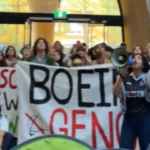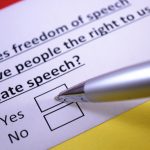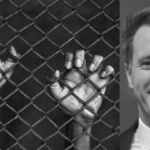Proposed Federal Anti-Hate Speech Laws: Silencing Outrage Over Gaza

Israel recently dropped huge metal bombs on Palestinian civilian refugees, mainly women and children, sheltering in tents in an area of Rafah that Israel had designated a safe zone.
Yet, those in the Australian community making loud protestations about this face being labelled as antisemitic.
Communications minister Michelle Rowland has been banging on about a “breakdown in social cohesion” this week, which she’s blaming on rising antisemitism, and not her government’s support for Israel as it flagrantly breaks international humanitarian law to perpetrate a genocide in Gaza.
But not to worry, attorney general Mark Dreyfus is coming to the rescue, as he’s now drafting hate speech laws, which might carry real prison time.
And while these laws will do nothing to prevent more children being bombed to death in Rafah, that’s beside the point, as the main aim of the Dreyfus hate speech laws is to stop local protesters and students chanting pro-Palestinian slogans that ruffle the PM’s feathers.
Labor came to power promising religious discrimination laws, which Dreyfus confirmed in January would include hate speech. But over the next months, PM Anthony Albanese repeatedly requested standalone hate speech laws instead, after a doxxing incident involved a Jewish WhatsApp group.
And while Israel slaughtering Palestinians for months on end has seen a rise in Islamophobia and antisemitism, what Labor’s actually attempting to silence with its proposed hate speech law is the massive groundswell of Palestinian support, which is purposefully being misconstrued as antisemitic.
It’s all about the context
Albanese determined not to progress his religious discrimination legislation in March, unless he had confirmed bipartisan support for it beforehand. But the PM did stress the need for Dreyfus to draft laws against extreme hate speech, due to the fallout from Gaza.
Israel commenced the mass slaughter and systematic starvation of the population of Palestinians living in Gaza last October. The mass atrocity began in response to a Hamas ground attack on southern areas of Israel. And the reprisal has been disproportionate in the extreme.
The Albanese government, in line with the US and other western nations, has taken the official Israeli position, which is it’s been acting in self-defence, while in actual fact the occupying force has been indiscriminately killing tens of thousands of Palestinian civilians, mainly women and children.
To the credit of vast numbers of Australians, they didn’t buy the official lie, as the truth was streaming live on their phones, and hundreds of thousands have taken to the streets to protest the mass death of fellow humans. And in contrast, no mass protests for the genociders have occurred.
To the shame of major party politicians, however, they’ve attempted to frame these pro-Palestinian protests as antisemitic, despite the fact that these protests have been led by Jewish people and Palestinians, which is a phenomenon being repeated around the globe.
So, the political support for Israel as it perpetrates the greatest atrocity since World War II is a bipartisan affair, with Liberal leader Peter Dutton keen to see the law, and he raised antisemitism as necessitating them, despite his party having a habit of trying to weaken hate speech laws.
Federal hate speech law
The laws the AG is drafting are to be introduced in August. And they’ll have a much greater reach than current federal hate speech law, which focuses on race.
The proposed new measures would protect against hate speech that’s discriminatory in terms of race, sex, sexuality, gender and religion.
The current law sits in section 18C of the Racial Discrimination Act 1975 (Cth) and makes it illegal to commit an act “reasonably likely, in all the circumstances, to offend, insult, humiliate or intimidate another person or a group of people” based on race, colour or national or ethnic origin.
The hate speech law holds when such acts are done in public and it applies to causing words, sounds, images or writing to be communicated in public, an act done in a public place, or one done within the sight or hearing of people in a public place.
The push by the majors for the new hate law is due to the scare campaign about rising antisemitism, which the political class is waging. And this is despite 2003’s Federal Court case Toben versus Jones finding that the 18C law does apply to Jewish people in a case related to Holocaust denial.
The 18C law, however, has never been applied to Muslims or members of any other faith.
In order to prosecute an 18C incident, the individual offended against must lodge a complaint with the Australian Human Rights Commission. And if the issue cannot be resolved through conciliation, it can proceed to court and a successful case will likely result in monetary compensation awarded.
Then PM Tony Abbott vowed to water down 18C in 2014, with his attorney general George Brandis notoriously stating that people had a “right to be a bigot”. The Liberals sought to remove “offend” and “insult’ from the law, but in 2017, when then PM Malcolm Turnbull put it to the vote, it failed.
Labor’s proposed law would differ as it would be a criminal offence, involving an accused being arrested, charged, tried and if found guilty, sentenced. A judge would determine the penalty based on the maximums that apply, and it’s yet to be confirmed whether this will include prison time.
Dangerous precedents
Liberal shadow attorney general Michaelia Cash on Monday, queried whether the new hate speech laws will criminalise the slogan, “from the river to the sea, Palestine will be free”, while shadow immigration minister Dan Tegan said his party is keen for the law if it has a focus on antisemitism.
And here we come to the crux of the new law, as it’s being drafted after there has been a concerted effort to discourage and demonise the widespread pro-Palestinian support in the community, and the key way of doing this is by labelling it as antisemitic.
Indeed, members of both the Liberal and Labor parties have been propagating a dangerous conflation that equates criticism of the Israeli state or the genocide in Gaza as being antisemitic, or put another way, constitutes hatred towards Jewish people.
Labor Senator Fatima Payman broke ranks with her party on 15 May to call out Israel’s actions in Gaza as genocide, and she ended her pointed speech by stating, “From the river to the sea, Palestine will be free.” However, Albanese called this out as “inappropriate” in the lower house the next day.
Meanwhile in the Senate, Liberal MP Simon Birmingham moved a motion, outlining that, ‘from the river to the sea, Palestine will be free,’ opposes Israel’s right to exist and is frequently used by those who seek to intimidate Jewish Australians via acts of antisemitism”.
And this motion gained overwhelming bipartisan support, even though Israeli PM Benjamin Netanyahu is the leader of the Likud Party, and its founding manifesto states, “between the sea and the Jordan there will only be Israeli sovereignty”.
And someone ought to further inform Labor, the Liberals and the Nationals that both Palestinians and Jewish people are Semitic peoples. And both Palestinians and Jewish people have been leading the local pro-Palestinian protest rallies that the political class is at pains to label antisemitic.
The US lower house passed the Antisemitism Awareness Act of 2023 (US) on 1 May. It provides a definition of antisemitism that can be read to imply criticism of Israel or Zionism, the doctrine to establish a Jewish state in Palestine, are captured by the law. And the bill is now before the Senate.
The process in the States began in December when the lower house passed a motion equating anti-Zionism with antisemitism, which was a move that shocked the globe. But now our parliament has passed a similar motion condemning a chant calling for Palestinian freedom and self-determination.
And while the idea that Dreyfus is going to come to the table with his own antisemitism awareness bill is unlikely, it does remain to be seen, with the US examples set and the opposition calls coming, whether the nation’s chief lawmaker will attempt to outlaw vocalising opposition to apartheid Israel.







